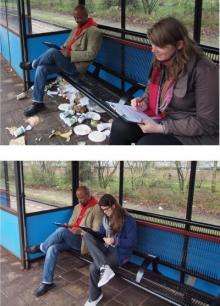April 8, 2011 report
Study shows disorder may cause an increase stereotyping

(PhysOrg.com) -- A study performed by Dutch social scientists Diederik Stapel and Siegwart Lindenberg, of Tilburg University in the Netherlands, suggests that people may resort to stereotyping to cope with the stress associated with disorder or chaos. In their paper, published in Science magazine, the two draw from a series of experiments they conducted, two in the real world and three in the lab, which they assert proves that human beings are more prone to stereotyping and even discrimination when exposed to a messy, chaotic, or even unkempt environment.
In the first study, volunteers at a messy (due to a workers strike) train station were asked to sit in one of several available seats while they filled out a survey. Unbeknownst to them, tabs were kept on how far they sat from the only other person in the group of chairs, a black man. They then repeated the study after the strike was over and found that when the station was messy, the volunteers (all white) tended to sit farther away from the black man than they did when the station was neat. Furthermore, they also found that the volunteers answered the survey questions more strongly stereotypically when in the messy environment, then when in the clean one; such as when asked to rate people of different races by traits that might be ascribed to them.
In a second field study, volunteers were again asked to fill out a survey (this time for a small amount of money as payment) but this time the environment was a sidewalk in a nice neighborhood. In the first go-round, an “abandoned” bike was placed nearby, some cobblestones pulled to look haphazard, and a car was parked up onto the curb; all to create a somewhat messy environment. After filling out the survey, the volunteers were asked if they would donate some of the money they had earned to helping restore blighted, mostly minority neighborhoods. In the messy environment, the volunteers offered on average, a dollar less than those on the clean street.
Next, the researchers conducted three lab experiments where volunteers were shown an unkempt bookshelf, a series of flash cards with words of discord on them and sheets of paper with unordered shapes displayed, before being asked to fill out a survey; and then repeated the exercises with a neat bookshelf, flash cards with calm words and sheets of paper with ordered shapes on them. In all cases the volunteers showed an increased tendency to revert to stereotyping.
The authors then conclude in their paper that this proves that messy, crumbling poor neighborhoods contribute to stereotyping, racism and discrimination; and if governments would only clean up such environments, a reduction in such attitudes would surely follow. Unfortunately, as many critics of the paper have pointed out, the study doesn’t have a way to measure if the effects of disorder are short or long term, or if people in the real world who grow up in such an environment don’t see their surroundings as normal and therefore would not respond as did the volunteers in the study.
More information: Coping with Chaos: How Disordered Contexts Promote Stereotyping and Discrimination, Science 8 April 2011: Vol. 332 no. 6026 pp. 251-253. DOI: 10.1126/science.1201068
© 2010 PhysOrg.com















